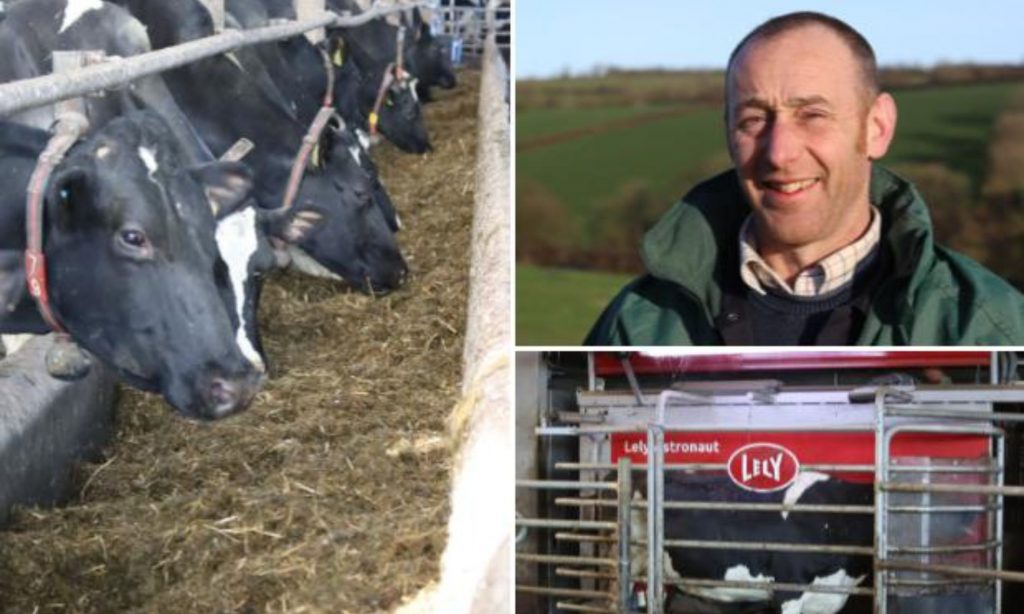
Like many milk producers, Andrew Griffin is facing the challenge of cutting emissions. By changing to Harpers Planet Dairy products, he has successfully cut 75 tonnes of soya from his diets, slashing emissions from his 150 cow all-year-round calving Holstein herd. And the cows have continued to perform as well as before.
Lower Wheatley Farm near Launceston is a real family concern with three generations working with the herd. Andrew runs the farm with his parents Ray and Val with help from Andrew’s partner Charlotte and now his children Jazz and Jack are enjoying being involved with the farm.
The 252-acre farm is mainly down to grass with around 50 acres of wheat providing crimp for the cows. Grass silage is the only forage made with three cuts taken with the aim of producing a high quality, high protein feed. 2022 first cut was 15 per cent CP while second cut was 13.8 per cent CP.
In June 2020, the family made the decision to invest in two robots and to refine the system. Cows no longer graze, instead being fed a mix of zero-grazed grass and silage in the summer supplemented with a protein blend and crimped wheat. This has helped increase forage utilisation as Andrew can adjust the balance based on the dry matter and quality of the cut grass.
Concentrate allocation has also improved as previously the cows were fed dairy compound to yield through out-of-parlour feeders. Access times meant it was difficult to get concentrates into the cows when at grass.
The zero-grazed grass is fed usually from March until mid-October, and the higher protein content means that a lower protein blend could be fed. In the winter the cows were fed a TMR comprising of grass silage, home-grown crimped wheat, molasses and soya formulated to M+25 litres. Dairy compound is fed through the robots. Fresh cows start on 3kg/day building up to 12kg/day which is held until 60 days in milk, after which cows are fed to yield.
Performance has increased significantly since the move to robots with yield increasing from 8500 litres sold to 10680 litres with the herd on target to produce 11400 litres. Milk quality has been good at 4.35 per cent fat and 3.35 per cent protein with cows averaging 32 litres per day with a feed rate of 0.33kg/l.
Being an Arla supplier, Andrew is having to review the system to look at the most effective way to gain as many sustainability points as possible to help and improve his milk price.
While the scheme identifies numerous management areas where action will have a positive impact on sustainability and be eligible for points including feed efficiency, land use and fertiliser efficiency, Andrew wanted to focus on protein and efficiency and sustainable feed, particularly removing soya.
By making better use of grazed grass and producing high protein silage he had been able to reduce total purchased protein and in October 2022 he made the decision to switch to Harpers Planet feeds.

The Planet range of dairy compounds and blends, launched in 2019 was the first feed range in the UK formulated to eliminate the use of ingredients linked to environment damage, in particular hipro soya, soya hulls, biscuit meals and palm kernel. Planet Dairy compounds and blends contain zero soya products and palm kernel. They have been replaced with proven ingredients with a lesser impact on the environment including protected rapeseed, wheat distillers, rapeseed, sugar beet pulp and wheatfeed.
He replaced the 17 per cent Harpers Glycogenic compound with Harpers Planet 17%. In addition he replaced the 800g/cow/day of soya in the TMR with Planet Nova 40, a 40 per cent protein blend based on rapeseed and protected rape.
Because the blend contains a better balance of proteins which can be used more efficiently by the cows, the total diet has been reduced from 16.5 per cent crude protein to 15.9 per cent. This is equivalent to a saving of almost 4 per cent in total crude protein fed, meaning protein efficiency has been improved.
As soya has been almost a default ingredient in dairy diets for more than 50 years, Andrew was concerned about how cows would perform when the change was made. Since making the change the cows have continued to milk as well with no change to yields or milk quality. Fertility has remained good with 45 per cent conception to first service and a predicted calving index of 387 days.
The cows have remained very settled with good lying times, dung has been very consistent and they have a healthy shine to their coats.
By balancing the proteins in the diet it has been possible to remove soya without affecting the cows at all. While performance has remained unchanged Andrew has saved 75 tonnes of soya which has had a significant impact on herd emissions.
Using industry standard figures, removing the soya had reduced his net emissions by around 300 tonnes of carbon, or 0.17kg carbon per litre produced, a significant reduction in his carbon footprint per litre. The impact has been measurable, has been achieved quickly and without increasing costs.
With Arla points being recorded soon and affecting his milk price, Andrew is well placed to make sure he receives the available bonus.





















